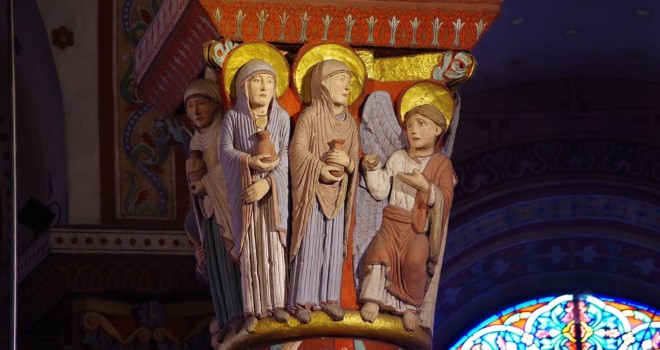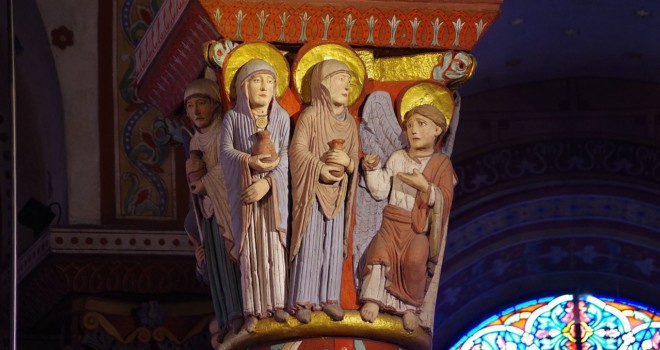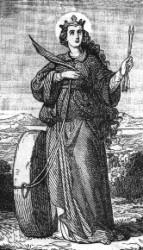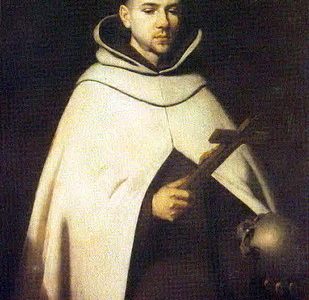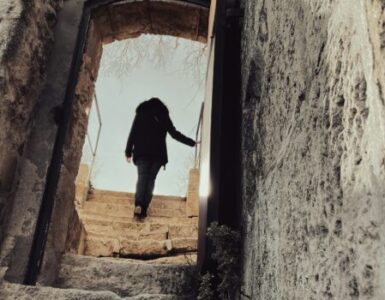In this Sunday’s Gospel, Jesus tells a parable to explain that the coming of God’s kingdom will separate the wise from the foolish. What will bring that moment of truth?
Gospel (Read Mt 25:1-13)
Today’s parable about wise and foolish virgins presumes understanding of a Jewish wedding custom of Jesus’ day. The betrothed bride and her entourage (family, bridesmaids, friends) waited in her home for the arrival of the bridegroom. He came to her home to take her, as his wife, to their own new home, where a week-long celebration would be held. The bride’s entourage joined in this procession, which took place after sunset. Jesus tells us from the outset that the bridesmaids were an assortment of wise and foolish virgins.
What made some of them wise? They realized that they would not know the precise time the bridegroom would appear, so they took along enough oil for their lamps to cover any delay that might occur. They knew that a lamp was useless without oil to keep it lit. A night-time procession would need light on the path. In other words, they thought ahead about the purpose of the evening—the bridegroom’s arrival and the wedding procession—and went to the bride’s home prepared.
The foolish virgins failed to do this. What might have prevented them from anticipating a possible delay of the bridegroom’s arrival and their need for extra oil? Perhaps they were too busy thinking about what they would wear to the celebration, or what food was likely to be served, or who would and wouldn’t be there, or if they might meet eligible bachelors. In other words, perhaps they were too self-absorbed to remember why they were in attendance at the bride’s home in the first place—they had forgotten about the bridegroom’s arrival and the need for light during the procession out into the night.
In the parable, the bridegroom was “long delayed,” and everyone fell asleep. Suddenly, “at midnight, there was a cry.” The bridegroom had arrived, and the purpose of the evening was suddenly brought to life. The reason they had all gathered together was to participate in the procession to the wedding feast. The lamps they brought needed to give off light. Only the wise virgins were ready for this. The foolish virgins had to go out in search of oil for their lamps. This made them late to the feast; the door had already been shut to outsiders. Even when they banged on the door and pleaded to enter, the master of the home did not recognize them as being part of the original wedding party (they could simply have been party-crashers), and they were denied entrance.
What point did Jesus make with this parable? “Therefore, stay awake, for you know neither the day nor the hour.” That’s mysterious! In its context in St. Matthew’s Gospel, we understand that Jesus means us to see that he is the Bridegroom. He will appear at a time unknown to us, His Bride, to bring us to the consummation of our betrothal to Him. What then, will we always need in order to be ready for this happy event? One thing we don’t need is to try to figure out a timetable for His return! That, indeed, would be the height of foolishness after reading this parable. No, what we do need is oil in our lamps to make them burn brightly, to light the way to the wedding feast.
Earlier in this Gospel, Jesus already explained what makes the lamps of our lives bright with light: “You are the light of the world. A city set on a hill cannot be hid. Nor do men light a lamp and put it under a bushel, but on a stand, and it gives light to all in the house. Let your light so shine before men, that they may see your good works and give glory to your Father who is in heaven.” (Mt 5:14-16) What are these “good works”? Jesus went on to explain them at length in the Sermon on the Mount (see Mt 5-7).
Interestingly, at the end of this Sermon, Jesus also divides the wise from the foolish. The wise man hears and puts into practice all that Jesus taught in His sermon. This wisdom prepares a man for the storms of life. In today’s parable, a virgin’s wisdom prepares her for feasting with the bridegroom. In both cases, wisdom anticipates the future, looking beyond just the concerns and distractions of the now. The foolish are earth-bound, and thus they seek to please themselves. The wise know there is more to life than what earth can offer, and thus they seek God’s face, to please Him with their faith and obedience. For the wise, Jesus can come at any time and will find them ready, their lives bright with the life of His own life in them. What a celebration that will be!
Possible response: Lord Jesus, help me stay focused on the purpose of my life. I want always to be ready for You.
First Reading (Read Wis 6:12-16)
Here is a glorious salute to the beauty of wisdom personified, “resplendent and unfading.” Jesus, in His praise of wisdom and His exhortation to His followers to be wise, embraced the Jewish tradition of giving high honor to living wisely: “For taking thought of wisdom is the perfection of prudence, and whoever for her sake keeps vigil shall quickly be free from care.” Wisdom is to be treasured because it provides a guide for us to live well, to live in the way God designed us, to know our true end and live accordingly. Happily, as these verses assure us, those who earnestly desire wisdom will find it: “She hastens to make herself known in anticipation of their desire; whoever watches for her at dawn shall not be disappointed.” This is exactly what St. James wrote in his epistle about wisdom: “If any of you lacks wisdom, let him ask God, Who gives to all men generously and without reproaching, and it will be given him” (Jam 1:5). The challenge for us is to remember to ask, to recognize that we need it, and to understand the difference between knowledge (or information) and wisdom. Once we actively desire wisdom, “she is readily perceived by those who love her; and found by those who seek her.”
Possible response: Heavenly Father, thank You for Your generous promise to grant wisdom to all who seek it. I’m counting on that promise today.
Psalm (Read Ps 63:2-8)
If we ask ourselves how we can be ready for Jesus when He comes for us, either at the end of time or at the end of our lives, the psalmist gives us one wise answer—to keep God always at the center of our lives, remembering at all times that we came from Him and will one day return to Him. We can use every line of this psalm to check ourselves to see if it describes our own relationship with God. This will give us wisdom about where we are now and perhaps where we need to be in that relationship. For example, do we share the psalmist’s experience expressed here: “I will remember You upon my couch [bed] and through the night watches, I will meditate on You: You are my help, and in the shadow of Your wings I shout for joy.” A person who thinks and lives this way is one who is ready to see the face of Jesus without fear. He can say with the psalmist: “My soul is thirsting for You, O LORD, my God.”
Possible response: The psalm is, itself, a response to our other readings. Read it again prayerfully to make it your own.
Second Reading (Read 1 Thess 4:13-18)
St. Paul, in writing to the Thessalonians, wants to answer a specific question about a moment of interest to us all—the Second Coming of Jesus, to which our Gospel alluded. He wants to assure his Christian friends that those who have already died in Christ will be the first to arise. They are not lost in death. They have “fallen asleep,” so we do not grieve “like the rest [unbelievers], who have no hope.” He then describes the sudden return of Jesus, Who, “with a word of command, with the voice of an archangel, and with the trumpet of God, will come down from heaven.” At this historical moment, believers alive then will not have the experience of physical death. The Lord will simply take them as His own, and the new existence for man, eternal life, will begin. The reference to Jesus “in the clouds” and “in the air” have more to do with this translation from one mode of existence into another, as happened on Ascension Day (read Acts 1:9-11), than as a description of what it will look like.
See how matter-of-factly St. Paul writes about the return of Jesus. Yes, two thousand years have gone by, but the reality of His coming unexpectedly, at any moment, should never be dulled. On a calendar day within history, either at our own departure through death or His glorious return in victory to get us, it will happen. Here is the only question that matters: Will we have lived wisely or foolishly? Will we be ready, as St. Paul writes, “to always be with the Lord”?
Possible response: Lord Jesus, someday I will see Your face. Please keep me free from sin and protect me from all anxiety as I wait in joyful hope for You.
✠
image: The Parable of the Wise and Foolish Virgins, Saint-Austremoine church (Issoire) / © Olivier LPB / Wikimedia Commons / CC-BY-SA 4.0


